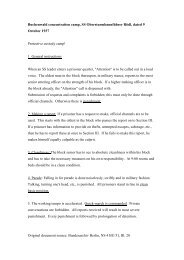English translation of original document
English translation of original document
English translation of original document
You also want an ePaper? Increase the reach of your titles
YUMPU automatically turns print PDFs into web optimized ePapers that Google loves.
From the Memoirs <strong>of</strong> Rudolf Höß concerning Theodor Eicke, written 1947He is to be seen as the real creator <strong>of</strong> the concentration camps [….]. He was also theperson who gave the concentration camps their form and appearance. In 1933 theReich Leader SS lifts him from the general SS and makes him Standartenführer at theDachau concentration camp following the dismissal <strong>of</strong> two incompetent predecessors.Eicke immediately gets down to reshaping the camp in line with his ideas. Eicke is arigid old Nazi from the "period <strong>of</strong> the struggle". All his doings are based on the idea:National Socialism has seized power for itself at the cost <strong>of</strong> heavy sacrifices and aftera long struggle: the task now is to unify this power against all enemies <strong>of</strong> this newstate. That is how he also sees the concentration camps. To him the inmates arealways enemies <strong>of</strong> the state, who have to be kept locked up, treated harshly and, in theevent <strong>of</strong> resistance, annihilated.In this spirit he teaches and educates his SS leaders. […] Inmates are handledseverely and harshly. The least <strong>of</strong>fence is punished by him with flogging. He has theflogging performed before the assembled guard personnel - at least 2 companies - inorder, as he puts it - to make the men hard. The recruits, in particular, are made towatch the floggings regularly. The Alpha and Omega <strong>of</strong> all <strong>of</strong> Eicke's teachings is:out there, beyond the wire, the enemy is lurking: he is watching all your doings inorder to pr<strong>of</strong>it from your weaknesses. Do not therefore display any weakness, showthe enemies <strong>of</strong> the state your teeth! Anyone showing even the least pity for theseenemies <strong>of</strong> the state has to disappear from our ranks.I can only use hard SS men, ready for anything, there is no place for s<strong>of</strong>ties among us.Eicke also does not tolerate any arbitrariness. The inmates are to be treated harshlybut justly. He alone can order punishments. He organizes surveillance in theprotective custody camp and thus has it in his hand. Gradually he subdivided thewhole concentration camp and gave it the form that was subsequently applied to allconcentration camps. He turned the guard force into a hard, rough team that reallyguards but is also quick with the rifle if an enemy <strong>of</strong> the state attempts to escape.Even the slightest <strong>of</strong>fence in guarding is punished incredible hard by Eicke. Yet hismen love him and call him "Papa Eicke". In the evening he sits among them in theircanteen or in their quarters. Talks to them in their language, listens to their troublesand worries, teaches and educates them into what he needs - rough, hard men whoshrink from nothing if he gives the order.
Every order given has to be implemented, even the hardest - this is what he demandsand preaches at every instruction. And these instructions go home, enter their fleshand blood. These guards <strong>of</strong> Eicke's period as Kommandant <strong>of</strong> Dachau are the laterprotective custody camp leaders, Rapport leaders and other leading functionaries <strong>of</strong>subsequent camps. They have never forgotten being molded by Eicke. […]In 1934 he becomes the first Inspector <strong>of</strong> Concentration Camps. Initially he controlsmatters from Dachau, then he moves to Berlin in order to be near to the Reich LeaderSS. He now embarks with ardent zeal on reshaping the existing camps <strong>of</strong> Esterwegen,Sachsenburg, Lichtenburg and Columbia on the Dachau model. Dachau leaders andmen are currently transferred to the other camps in order to bring with them the"Dachau spirit" and to become a little more military and Prussian. The Reich LeaderSS gives him a free hand, he knows that he could not entrust the concentration campsto a more "suitable" person. Himmler has repeatedly stated this quite openly, heapproved <strong>of</strong> Eicke's views on the concentration camps and on enemies <strong>of</strong> the state andcompletely shared these views. […]Even as Inspector, Eicke remained true - also later - to his practice <strong>of</strong> chatting to theguards and lower ranks <strong>of</strong> the Kommandant's staff without the presence <strong>of</strong> theirsuperiors. As a result he gained popularity and the loyalty <strong>of</strong> the men. […] To thesuperior <strong>of</strong>ficers this practice <strong>of</strong> Eicke's was not to their liking. For one thing, Eickelearnt everything that happened in the camp, nothing essential remained hidden fromhim. For another, he was always informed on the behavior <strong>of</strong> all the SS leadersoutside service hours. […] Later he had letter-boxes installed in every camp, whichhe alone could open, which meant that every man could turn to him directly withrequests, complaints and denunciations. He also had confidants among the inmates,who - unidentified - reported to him everything that was worth knowing. […]Eicke's personal life was very simple and reserved, he had a happy marriage to a verygood woman. They had a son and a daughter. He felt uneasy in his grand villa inOranienburg - generously built for him by Pohl. He would have preferred to stay inhis simpler apartment in Frohnau near Berlin.Eicke was hard - cruelly hard - in his orders and if these orders were not obeyed.Many an SS man - including a few leaders - were reduced to the ranks before theassembled men, clothed in inmates' clothes and given 25 lashes. He even bullied hiscousin in this way.
For the bulk <strong>of</strong> the inmates he has no inflexible understanding - they were enemies <strong>of</strong>the state - although he has taken the side <strong>of</strong> a few individuals, whom hje knew moreclosely. For his SS men he would do anything - whether only from comradeship orwith a purpose in mind I am unable to judge.Personally he was clean and untouchable.Original <strong>document</strong> source: Institut für Zeitgeschichte, F 13/6, Bl. 369-82<strong>English</strong> <strong>translation</strong> and copyright by Ewald Osers





